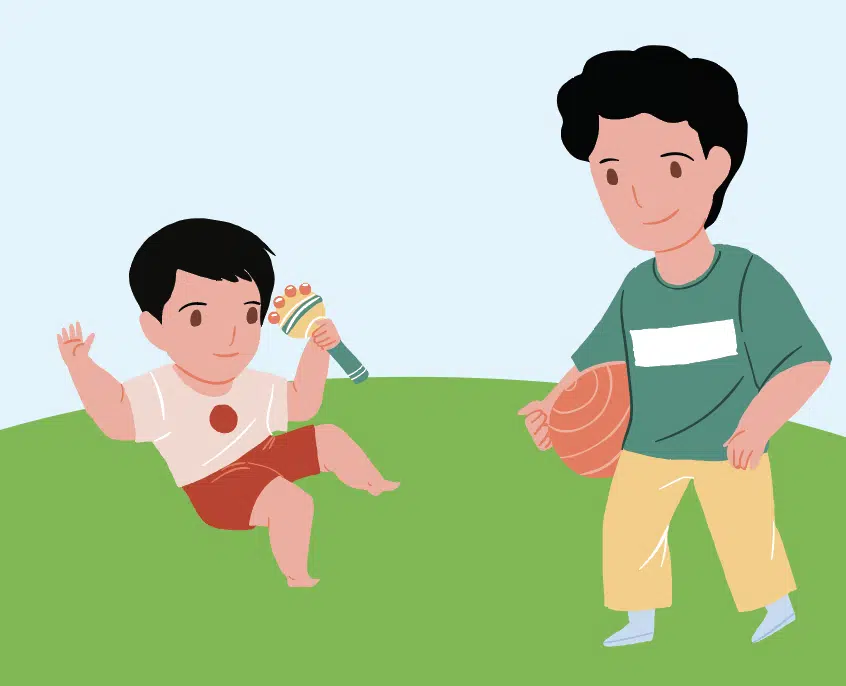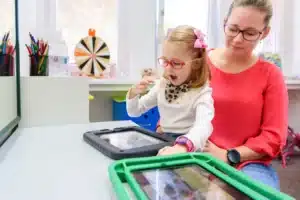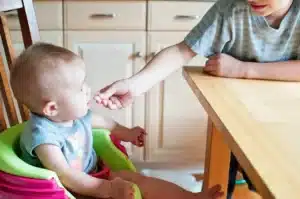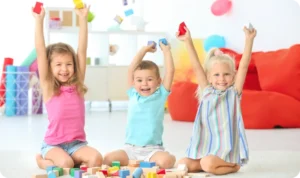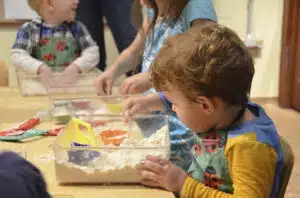By Nicole Tutaj, MA, OTR/L
Parents are often concerned when their child is not playing with others. Often times, it’s possibly because they are still too young as they are learning how to engage and play with toys on their own before they can play with others.
Why is play so important? A child’s main occupation is play.
Play helps children develop skills across all areas including language and communication, physical development, and cognitive skills. Play helps support their overall development and will provide them with the foundational skills necessary to learn how to read, write, problem-solve, cooperate with others, and regulate their emotions.
Sociologist and researcher, Mildred Parten, idenitfied 6 stages of play in children after observing free play in preschool aged children. Parten’s 6 stages of play are:
1) Unoccupied Play (Birth-3 Months)
This stage of play happens almost immediately after birth as children begin to kick, move their arms and legs randomly, and begin exploring various toys. This can look like tummy time, playing in a baby gym, or looking at high contrast (black and white) images or books presented in front of them.
2) Solitary Play (3 months-2 years)
Solitary play is when children explore and engage in free play without any structure or agenda. They begin to engage with a variety of toys, learn how to use them, and explore the environment on their own. During this stage, they are often self-directed in how they play and begin to develop problem-solving skills by experimenting.
3) Onlooker Play (2 years)
Onlooker play involves children watching others but not participating in the activities. This is a way for children to learn from others since we learn many of our skills through imitation. At this stage, many children begin to learn social cues, rules surrounding play, and how to engage with others.
4) Parallel Play (2+ years)
In parallel play, children play along side each other with their own toys. Sometimes it may be the same or similar toy as another child, but it doesn’t have to be. Children may begin sharing toys without actually interacting with one another, by playing with the same toy in different ways near each other or using the toy after one has finished and has set it to the side. They may observe each other and mimic how their peers are playing.
5) Associative Play (3-4 years)
During this stage of play, children begin engaging with others during various activities or with toys. They may start to share toys, develop communication skills, and learn to play together. Although they are playing together at this stage, they typically don’t have a shared goal they are working towards. At this stage, children may also start asking their peers what they are doing and how they are doing it, as they observe their play and learn. Play at this stage can look like sharing brushes and painting at the same table or play with the same Lego set but create separate structures.
6) Cooperative Play (4+ years)
This stage represents social play as children begin to play with their peers using the same toys and have a shared common goal. This is when they begin to fully develop skills like sharing, taking turns, teamwork, and problem-solving. This stage of play can be difficult for children as they are navigating working with others, so it is important to help support their social-emotional learning and ability to work through conflicts. Examples include playing board games together, engaging in sports, pretend play where each child is assigned a role.
References
Parten M.B. Social participation among preschool children. Journal of Abnormal and Social Psychology . 1932;27(3):243–269.
O’Brien, J. C., Kuhaneck, H., & Ball, B. A. (2020). Case-Smith’s occupational therapy for children and adolescents. Elsevier.
